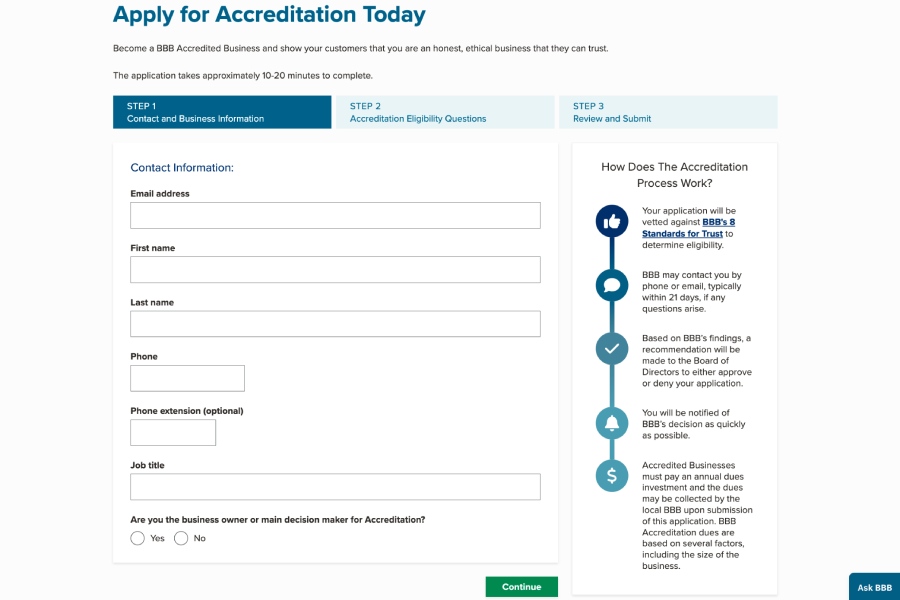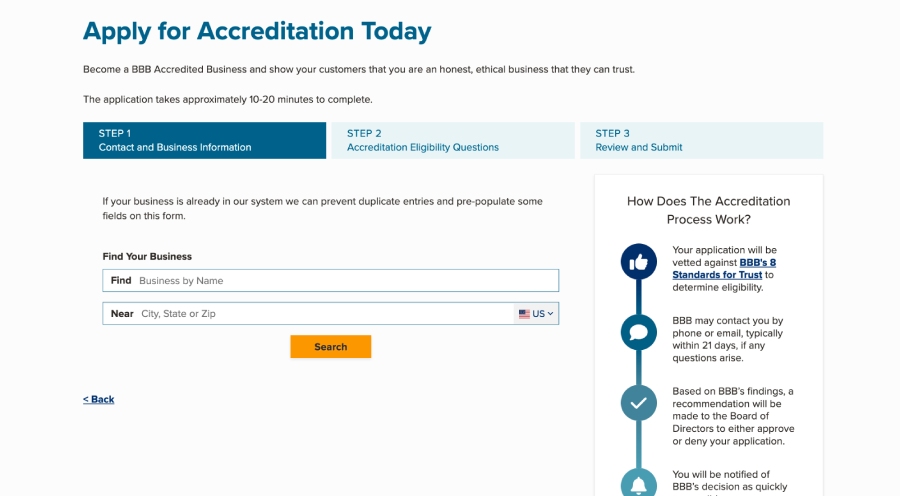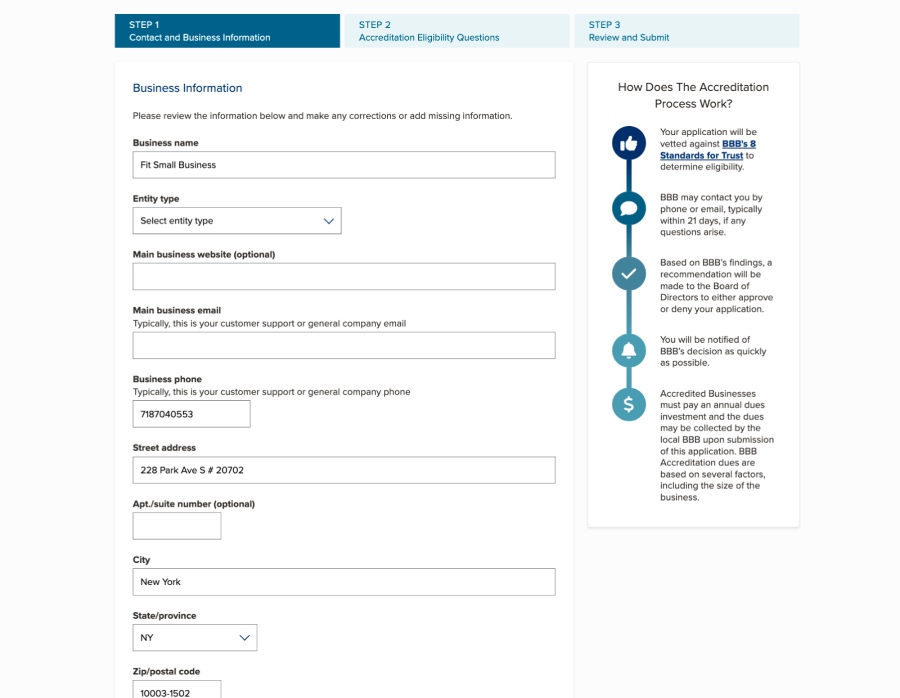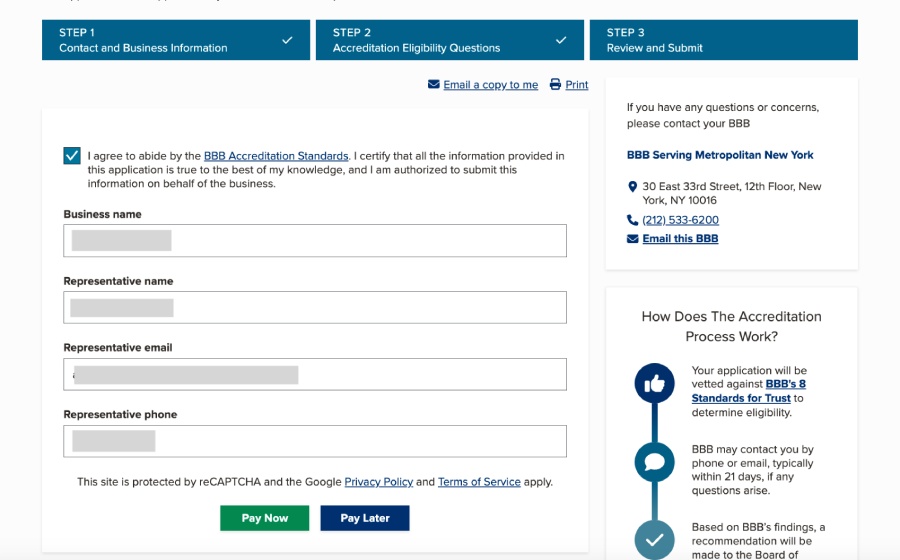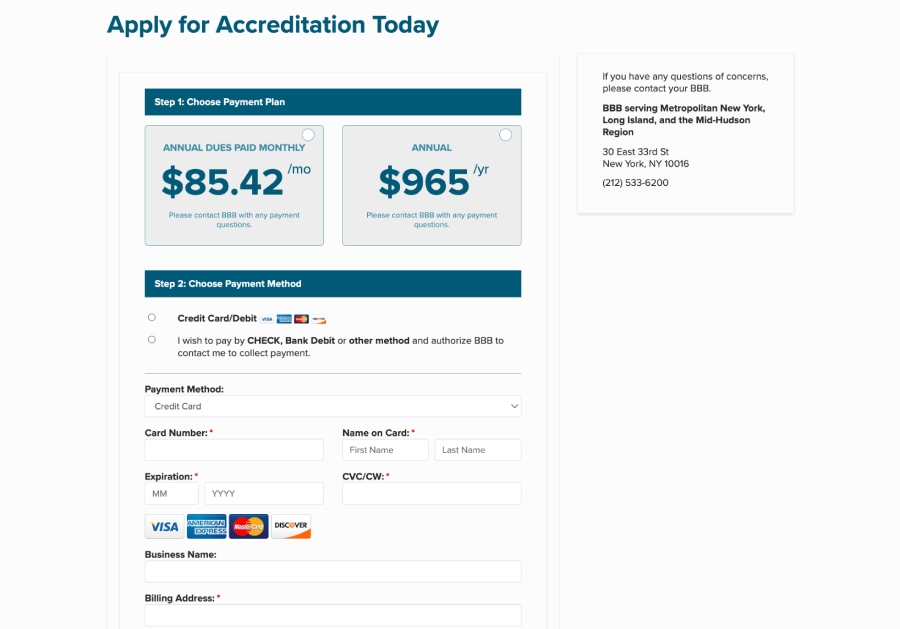Getting BBB accredited can open doors for your small business. A BBB accreditation (aka a Better Business Bureau accreditation) is a certification from the Better Business Bureau that shows customers you’re a credible, good-standing business. While it isn’t a requirement, it’s something to consider setting your sights on for building your long-term brand reputation.
And learning how to get BBB accredited might not be as complicated as you think. Read on for everything you need to know about getting BBB accredited, how it works, its biggest benefits, and the application process.
What Does It Mean to Be BBB Accredited?
A BBB accreditation is like a seal of credibility for your small business. It places you in the community of businesses verified by the Better Business Bureau, which vets good and trustworthy small businesses. Its goal is to create a healthier and ethical small business ecosystem for consumers.
The BBB accredits businesses based on eight standards:
- Build Trust: Businesses must have a good track record, operate for at least six months, fulfill all licensing requirements, maintain a B rating, and have zero government violations.
- Advertise Honestly: Follow all legal and ethical advertising policies (no misleading ads or exaggerated claims).
- Tell the Truth: Always represent your products and services truthfully, both internally and externally—from how you communicate with your employees to how you write your marketing messages.
- Be Transparent: Be clear about business details like its nature, location, and ownership, both to the BBB and to customers.
- Honor Promises: Always follow through on contracts and commitments your business makes, including resolving outstanding BBB complaints.
- Be Responsive: If the BBB requires any documentation from your business, respond in a way that’s professional and adequately addresses the request.
- Safeguard Privacy: Handle all sensitive information about your customers with utmost security, such as credit card information, Social Security numbers, or salaries. Make sure your website has a privacy policy, and disclose how you collect and handle information.
- Embody Integrity: This simply means to handle all your business practices in good faith, from production to promotion and beyond.
As you might have noticed, all these standards are just plain and simple guidelines on being a good, reputable business. All of them are things your business needs to fulfill before you can get accepted for accreditation.
Benefits of Getting BBB Accreditation
So is it actually worth it to get accredited by the Better Business Bureau? From a marketing and branding perspective, yes. More than anything, a BBB accreditation grants you the best seal of credibility possible for a small business. Take a look at some of the biggest benefits of getting BBB accredited.
- It makes your brand trustworthy. More than anything, increased trust is the biggest benefit of BBB accreditation. A BBB seal of approval makes your business more reputable and lets customers know you’re worthy of their business—especially in a time when customers are warier than ever of scams or dishonest businesses.
- It attracts more customers. This is correlated with having better brand trust. Research has even shown that 80% of consumers would trust a BBB-accredited business over a non-accredited one with an A+ rating.
- It helps you get discovered by local audiences. The BBB is also an online directory for small businesses, like the Yellow Pages or Google Business Profiles, but specifically for businesses in your area, making it one of our best local advertising ideas. Not only that, audiences can also contact you directly via the BBB website.
- It’s recognizable across generations. The BBB has been around since 1912, and it’s still a mark of credibility today. So no matter who you’re marketing to, from Baby Boomers to Gen Z, the BBB logo is the sign of a trustworthy business.
Is learning how to get BBB accredited worth it? If being a trustworthy business and attracting new customers is important to you, definitely include BBB accreditation as part of your local marketing strategy. Here are some other instances where your small business can benefit most from getting BBB accredited:
- You have a steady customer base but want to grow your business and build a stronger brand presence in your area.
- You have industry competitors and want to stand out—a BBB accreditation gives you that edge and signals that you’re a trustworthy business.
- You plan to expand to new locations and want to capture new customers.
- You have a fully online business and want customers to know you’re 100% legitimate (especially if you have many competitors).
On the other hand, I don’t recommend placing BBB accreditation on top of your marketing to-do list when you’re just starting out. Applying for the BBB should come when your business is already running and has a steady marketing foundation.
How to Get BBB Accredited in 3 Steps
If you’ve decided to go ahead and apply for accreditation from the BBB, follow the steps for the application process below. The whole thing can be done via the BBB website. Just fill out the application form, answer eligibility questions, and await the BBB’s response.
Step 1: Fill Out the BBB Accreditation Application Form
Visit the BBB’s online application. There, you’ll find a form to fill in your email address, name, phone number, and title, and whether you’re the business owner or main decision-maker. If you’re not the main decision maker, you’ll need to fill in their contact information.
After filling out the form, select the green “Continue” button, which will prompt you to search for your business in the “Find My Business” window. After finding your business, fill in all the remaining fields.
Step 2: Answer BBB Eligibility Questions
After selecting “Continue,” you’ll need to answer questions about your business’s BBB eligibility. These will be based on the eight BBB standards I outlined above. Questions will involve how long you’ve been in business, your annual revenue, and if you have more than one location.
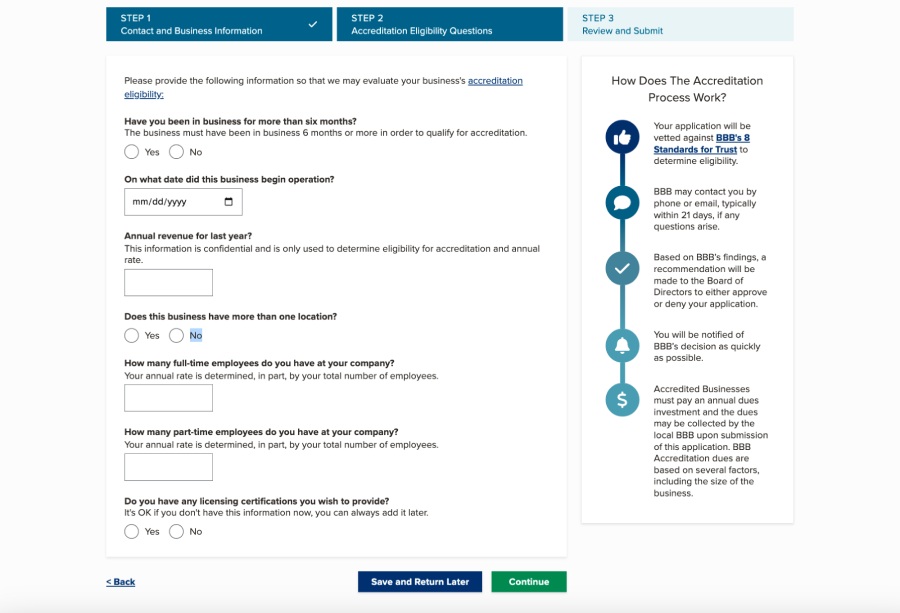
Answer the BBB’s eligibility questions based on its accreditation standards. (Source: The Better Business Bureau)
Step 3: Review and Submit Your BBB Application
After answering the BBB’s eligibility questions, review your information, check the consent box, and submit your application. You’ll then be prompted to pay the membership fee, a requirement for accredited businesses. You can also pay it later after your application is approved.
BBB Accreditation Costs
The cost of better business bureau accreditation depends on how many employees your business has. The bigger your business size, the higher your membership costs. You’ll find the exact fees for your business after submitting your application. In 2025, however, you can expect the annual membership cost for a business with more than 10 employees to be $965 (or $85.42 a month), according to my research.
After submitting your application, all that’s left is to wait for the BBB to contact you. In most cases, as long as you meet all its credibility standards and fill in all the correct information about your business, the BBB should grant your application.
The review usually takes a few weeks (up to 21 days), after which the BBB will contact you via email or phone and inform you about your application. If you’re granted an accreditation, you’ll also get a grade rating from A+ to F. You’ll need to sustain your membership annually by paying annual renewal fees.
If you are not granted accreditation, the BBB will explain why. They’ll also give you the timeframe for when you can reapply, the appeals process, and the steps you can take to secure accreditation in the future.
How the BBB Grading System Works
As mentioned, the BBB awards accreditations to businesses based on a rating system. Like school grades, this rating system is based on the points your business gets, which is based on factors like how long you’ve been in business, how many complaints you get, and the type of business you have.
Your business starts with 100 points, and deductions are made according to each factor. Your overall score will then be equivalent to the following grading system.
Score | Equivalent Grade |
|---|---|
97 to 100 | A+ |
94 to 96.99 | A |
90 to 93.99 | A- |
87 to 89.99 | B+ |
84 to 86.99 | B |
80 to 83.99 | B- |
77 to 79.99 | C+ |
74 to 76.99 | C |
70 to 73.99 | C- |
67 to 69.99 | D+ |
64 to 66.99 | D |
60 to 63.99 | D- |
0 to 59.99 | F |
Alternatives to BBB Accreditation
For getting the stamp of approval for your business’s credibility, there’s no exact equivalent to a BBB accreditation. But as I’ve mentioned, it’s not the best option for every business, especially those that aren’t looking to expand their reach in the near future or don’t have the budget yet. There are other ways to get your business noticed by local audiences.
- A Google Business Profile: Create a Google Business Profile for free and complete the process to verify your business. While you won’t get a seal of approval, you can collect user reviews on your profile, which is also an effective way of building your credibility.
- An SBA certification: SBA certification from the US government can help socially and economically disadvantaged small businesses get assistance. You can apply if your business is at least 51% minority, women, indigenous, or veteran-owned.
- The Yellow Pages: Like Google Business Profiles, listing on the Yellow Pages is completely free. While it doesn’t offer a certification, it’s long been a trusted source for communities to discover local businesses.
- A B Corp certification: If you have a social or environmental-focused business, a B Corp certification is the global standard seal of approval. It shows your business is committed to fulfilling its social or environmental values.
- Industry-specific directories like Yelp and Angi: Online business directories are also usually free or have a small membership or advertising fee. And they can help you reach people looking for your specific products or services.
Frequently Asked Questions (FAQs)
A BBB accreditation is a certification from the Better Business Bureau (BBB) that certifies small businesses based on eight standards: build trust, advertise honestly, tell the truth, be transparent, honor promises, be responsive, safeguard privacy, and embody integrity. It certifies small businesses that are credible and honest. Having a BBB certification builds your brand reputation and makes you more trustworthy to customers.
Not having a BBB accreditation won’t harm your small business—you’ll still be able to operate normally. However, it can help your business by making it more credible to visitors and by boosting its visibility because it’ll be listed on the BBB’s website. A BBB accreditation is a certification that your business is honest and operates in good faith.
The cost to get a BBB accreditation and membership depends on your business size. The more employees you have, the higher your membership rate. You’ll only see your actual rates after applying for accreditation. However, the cost for a business with 10 employees in February 2025 is approximately $85.42 a month or $965 a year. Smaller businesses will have a lower rate, while bigger businesses will have a higher rate.
Bottom Line
A BBB accreditation is a boost of credibility for your small business. It’s especially effective if you’re ready to build your brand for the long term and expand your customer base. While it isn’t a requirement, it’s one of the most tried and true ways to signal to customers that you’re worthy of their trust and business. If you’re ready to take the next step in your business’ marketing journey, it’s worth consideration.
